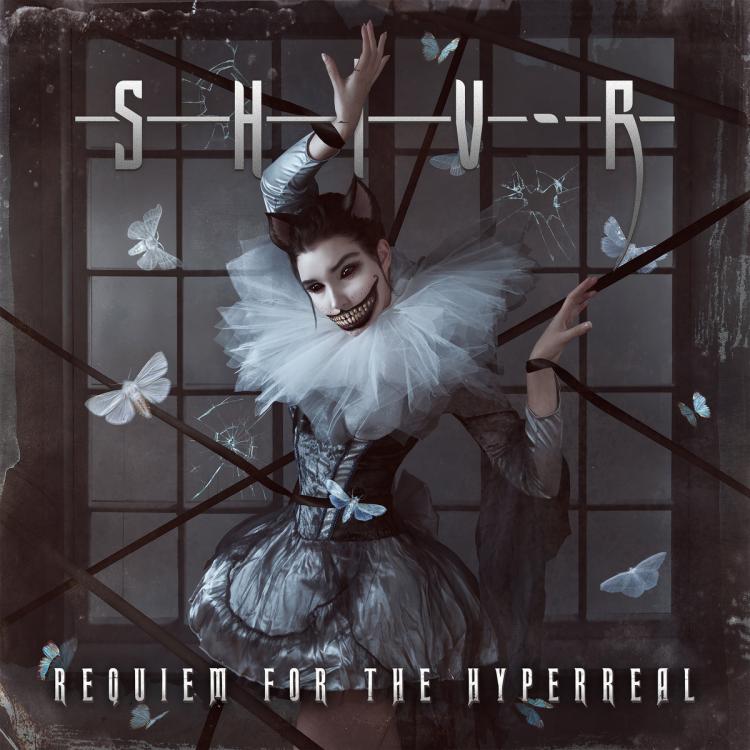
The Australian dark electro duo that is SHIV-R are hot on their heels for the release of their next album Requiem for the Hyperreal. After being teased with the single 'Cheshire Grin' released back in August, the album was announced with a handy dandy Vinyl edition in tow (pre-order HERE). With their newfound focus on being one hundred percent independent, we sat down with Pete Crane and Ben Bulig of SHIV-R to talk about their personal lives and, of course, the new album Requiem for the Hyperreal. While you read, be sure to hit that play button for their single 'Cheshire Grin'!
Hey guys! Welcome back to Brutal! I can't believe it, but it has been three years since we last spoke on the website. Between Shiv-R, Blind Mice, and your personal lives, how has everything been since then?
Pete Crane: It’s great to be back here and have a new release to discuss! There has been so much going on in the last 3 years that it’s actually overwhelming to think about. I’ve moved from Sydney to London and now to Melbourne, done SHIV-R shows in twenty countries across Europe and America, was traveling up to five countries a week at one point, been to some personal limits and honestly this album feels like a medal for keeping my shit together throughout this time.
Ben Bulig: It has been an incredibly busy past couple of years. There has also been some international moves on my end as well, having left Bangkok and settled in Melbourne along with Pete. I also went back to university for a while, which unfortunately slowed down the musical output for a while as well.
No need to dribble in all the standard bullshit, let's just jump right into the thick of things. You've got a new album coming out shortly titled Requiem for the Hyperreal on September 29th. While the Bandcamp page for the album gives a pretty good description of what it's about, let's get the details here as well. What is Requiem for the Hyperreal focused on thematically?
Pete: Hyperreality refers to a simulated version of our reality, the most obvious version being Disneyland, which in itself has multiple sub-realities that you can walk between and pretend to be a part of all for the price of admission, and because Disneyland exists, we know beyond a shadow of a doubt that the outside world is the real world, right? The context helps us find peace in the construct we live in. It has parallels to the music industry where image is vital and being marketed as a rockstar is indistinguishable from pure bullshit. Hell, I might even suggest to you that the German industrial scene is a hyperreality, being the biggest market for a specific type of music and being the source of some musicians’ identity and validation, but being completely irrelevant to so much of the world. I’ve been meeting people lately, awesome people with great tastes in music, who have no idea who Combichrist is, which is amazing because I feel like we’ve been under their shadow for our whole career and to meet awesome people who don’t even know them takes away that power. Coming back to Australia it feels like there’s a new generation of alternative people who didn’t grow up listening to :Wumpscut: and you can’t just play distorted 90s trance with cookie-monster vocals to these people – you actually have to be good beyond the context of a very specific European scene! The band SNUFF are inspiring to hang out with, because I feel they don’t care so much about the industrial scene in some ways, and they’re just so good because it feels like they evolved on a parallel timeline without being brainwashed that this specific European market is the be-all-and-end-all and to me they feel unique. This might be a stretch from the concept of hyperrealities so I’ll just bring it back by saying the album is an observation of the power of perception and delusion.

You gave a taste for the new album with the single Cheshire Grin. Obviously inspired by Alice in Wonderland, I personally interpreted the song as a narrative on escaping enclosure in any form. To you, what was the song about? And do you think Cheshire Grin is the perfect song to show what the new album is going to be about?
Pete: It could be interpreted as escaping enclosure absolutely, including the enclosures we put on ourselves. A recurring theme of the songs on the album is about denying aspects of our nature in order to present a more palatable exterior, to the extent that we find our own true potential terrifying. How we make tame pets from perfectly evolved hunters and mirror this with our own behaviours.
I actually don’t think it’s very representative of the rest of the album but we just really dig the song! It’s a pretty unusual song musically, which was really illustrated when we got the remixes in. Because the chorus has an unusual chord progression, the vocal melody works only in this exact context and over this exact progression. I don’t know why it works in terms of music theory as it breaks some rules but it simply does to my ears so I’m not questioning it too much. What’s interesting though is that for the remixes, ALL of the remixers chose to change the chord progression for the chorus, and this re-framed the vocal melody in an unusual way. For the Leaether Strip remix, Claus sent me an instrumental version so I chose to re-record the vocals in a new melody that worked over his new chord progression. Chris Vrenna’s remix did something interesting which was to shift up to a major mode for the chorus in order to accommodate the unusual vocal melody. So I’m sure it created some headaches for the remixers!
Ben: A big stereo bass line, a cool glidey synth solo, and weird suspensions in the chorus vocals. However, I don’t think it is particularly indicative of the album as a whole. I would go so far as to say that if there is one track on an album that encapsulates the album, either the track or the remainder of the album are redundant and something has gone awfully wrong. I would like to think there is no one track on this album like this, and that means there is enough variation in the release to make it worth listening to. For example, the self-indulgent 70s prog-rock synth solo thing, like the one Cheshire Grin, there is only ONE other point like that in the album. I think I deserve big-boy points for not sticking something like that in every available gap.
Has anything changed in Shiv-r in terms of your song writing, lyrics, or attitude in general? Shiv-r has always been a shapeshifting entity which is why your music is always fresh and beloved, but what is making Requiem for the Hyperreal its own beast?
Pete: The lyrical process has changed and this was due to finally accepting myself as a singer and lyricist. I never used to call myself a singer – I always just “did the vocals” because I didn’t want to work with a “proper singer”, but that was a very damaging attitude to my own growth as a singer. So now I am coming to terms with being confident that I have something valid to say in my lyrics and as a result they are not so “stream of consciousness” but are actually about concepts I want to convey. The same goes for performing and I learned you can stand confidently on a stage without needing to tell the crowd to “make some noise” in every breakdown and constantly run from one side of the stage to the other for fear of losing the crowd’s attention. I always used to make our backing tracks flow into each other without silences to keep the audience dancing but I made a small change to now have a break between each song. It’s a small move but the point is in being confident in the songs and letting them do the talking and believing that people can be captivated by our music beyond the constant kick drum. This is all to say that the biggest change has been confidence and self-belief which is manifesting in both small and large ways. Musically it’s worth mentioning that the equipment I had for the bulk of the writing of my parts was what could travel around the world with me in two suitcases, which fortunately included some strategic pieces of very good portable gear e.g. preamps, synths and monitors, but plenty of work was done for the album on a laptop on coffee tables and I think that agile approach must have influenced the outcome.
Ben: In contrast to Pete, moving my studio from Bangkok involved a literal shipping container on a literal ship in the literal sea. While I certainly don’t believe the gear makes the artist, there is a lot to be said for the way certain gear can inspire you. For example, the track 'Milk and Honey' started with a piano-ish line. That line came about after unboxing a fairly utilitarian synth module which had just four VCAs in it (An Oakley QuadVCA built by Krisp1, for those who are into such things). Out of principle, I wanted to make a patch using all four VCAs, as well as all the other VCAs I already had in the system. What came out was a patch so complex it sounds almost improvised. I don’t think I would have come up with it if I hadn’t gotten a bee in my bonnet about having enough VCA in my life. I think my parts over the years have had a bit of narrative mirroring whatever was the latest and greatest toy in the studio. Having newfound poverty since moving to a country with an exorbitant cost of living may change that approach in future material.

Walk us through the process of writing a Shiv-r song. Do you start with lyrics first? Or music? Do you two have any arguments over what should sound like what, or is there a pretty good symbiosis? Do you ever throw on boxing gloves and fist fight each other to make a decision final?
Pete: Sometimes I’ll have a song in my head for weeks before I get a chance to create it. E.g. for our song 'Incision' I remember walking around with that entire groove in my head, including the drums, guitars, vocal rhythm and general sound, so it was simply a matter of making it happen. Other times I’m not so inspired so I’ll simply start with a kick drum, add a bassline and layer it up from there. The songs are usually structured at least with a verse and chorus before the vocals are added, usually with temporary lyrics which I’ll then replace with something meaningful. These lyrics used to just be “cool words” but those songs really don’t stand the test of time for me, because to me those “stream of consciousness” lyrics could just as easily have been completely different and suit the song equally as well. Now that the lyrics are more meaningful they feel like the only words that could possibly have fit. So, to me the new songs feel more timeless. I’m sure they’re just as unintelligible to others but to me it’s more meaningful! Actually it’s quite cool because now that Ben and I are living in the same city we’ve been hanging out jamming with guitar and bass, and the songs from our new album as well as some from Wax Wings Will Burn actually work really well on this different instrumentation, which is surely a sign of a good song. I don’t think you could play 'The End' or 'Blood Spatter' on acoustic guitar. As for working together with Ben, we are pretty in tune and generally leave space for each other’s parts or know which of each other’s parts we can replace with our own to make the best outcome. Some songs have more parts from one of us than the other but it still works. I see it like a conversation Ben and I would have, being old friends, which might be about business or relationships or whatever – sometimes one of us will have something to get off our chest and the best thing the other can do is just listen while the other vents, whereas other times it will be a more equal conversation with contributions and insight from both. That’s the same as our music and if one of us has a mostly-complete song, the other will not try to shoehorn equal parts in for the sake of it. Not that I’m a Beatles fan but I heard Lennon and McCartney simply split their credits which enabled them to be prolific and just get on with things as opposed to wasting energy trying to outdo the other in terms of contributions.
I remember three years ago during our interview, you declared that Wax Wings Will Burn was the best Shiv-R release to date. I wonder, with the upcoming album do your thoughts and comments still remain the same? Or do you think Requiem for the Hyperreal is going to steal the spotlight from Wax Wings Will Burn?
Pete: I almost consider Wax Wings Will Burn to be our first album, and Requiem for the Hyperreal to be our second. If I could re-do the lyrics and vocals for our first two albums I would, but at the same time I’m proud that I didn’t wait until everything was “perfect” before charging ahead, because there’s no such thing as “perfect” and we had to put out those albums in order to fail faster and learn.
Ben: Obviously the latest release is always best release… from the artist’s mouth at least. If you were to compare it to our earliest releases, we are now certainly a world away from the wall of oontz we used to be. I guess for the listener that could either be great or disappointing. I would guess that most musicians who fall into a niche and never move from it are more often motivated by keeping an established base of listeners happy more than lacking the ability to do anything else. Personally, I couldn’t care less if people are disappointed with the lack of oontz in our more current stuff. I don’t especially like doing club music, and when you are doing something just for fun, doing un-fun things becomes hard to justify.

On a note of pure curiosity more than anything, I remember you guys stating that Blind Mice would be a more digital label than anything. This new Shiv-r record is coming out in both digital and vinyl formats. Not that I'm complaining as my mouth is already watering over the vinyl, but what made you have the change of heart? And will we see more physical merch from the label in the future?
Pete: A lot of big decisions were made about this album. The first was to leave Infacted Recordings and entrust our own label Blind Mice Productions with our releases. There was never a doubt that the new SHIV-R album should have a physical component, and we were originally planning on doing CDs as there are a lot of restrictions with vinyl. But when we explored the details we decided to embrace those restrictions and we made a “vinyl edit” in order to fit all 12 songs of the album onto a 12” surface, and as soon as we started making this edit we actually started to prefer this version as the songs are really succinct and the flow between tracks is really slick. The master is also less limited. So from our perspective, the vinyl version is actually the superlative listening experience. I kept asking friends “When was the last time you bought a CD?” and the response invariably came back on a scale of years if not decades, which reflects my own experience, so there really seemed to be no benefit to CDs over digital in terms of sheer practicality. As for Blind Mice, I can imagine us exploring vinyl for artists if the right release comes along, but we’re new to the medium and will be assessing how well it goes for SHIV-R. We won’t ever be making CDs for Blind Mice releases as a matter of course I don’t think. It’s utter madness to think that the first SHIV-R album was simultaneously released on CD by three different labels worldwide including Infacted and Metropolis – thousands of our CDs were out there with three labels’ mouths to feed and us being a new band trying to make it work. I think a lot of those discs have ended up in landfill and it’s the same for a lot of bands. Word ‘round the campfire is that one of the well-known independent labels of our scene has destroyed hundreds of thousands of unsold discs. I don’t ever want to contribute to that again just because a small number of our fans hate iTunes. At a certain point CDs become straight up irresponsible to manufacture.
Ben: A lot of labels and bands are in crux regarding physical releases, but it will probably ease up with time. Most of the people involved with releases, at least in this corner of the musical world, are people who grew up with CDs. That kind of physical product gives a release a sense of legitimacy that people in our generation will never be able to give up on. Music for "young" people like, like a lot of EDM, is entirely comfortable with digital only releases, and don’t have a nagging voice in the back of their minds telling them digital only is for upstarts with no fan base. Being old, however, we do have that nagging voice.
Speaking of Blind Mice Productions, let's talk about the label's side of things. The label has been steadily growing and in the past couple of months you've had some amazing smashing singles and EPs from Benjamin'sPlague, Moris Blak, and Nigen. Have you felt as if Blind Mice has become a bit more strong in the underground electronic scene?
Pete: Making Blind Mice the primary label for SHIV-R was partly strategic and we hoped that it would attract more acts to the label, and that has absolutely been the case. We’ve received a lot of demo submissions since announcing that SHIV-R would be on Blind Mice, so we’re in a good position where we can keep shaping the musical identity of the label.
What's new in development at Blind Mice? Obviously, you're going to be pushing the new Shiv-r as hard as possible, but do you have any upcoming releases from new artists that you can spill the beans on?
Pete: We’re currently mixing & mastering a new Benjamin’sPlague single but that’s all we can talk about for now!
Ben: So, you think we plan things?

In light of a couple of current events, I'd like to get your opinion on something. Do you find it hard to run a successful record label/band in today's modern market? Or do you feel as if the music industry needs to adapt with the way fans want to listen to music in the present and future?
Pete: For the SHIV-R releases we’ve partnered with DarkTunes in Germany to cover the European distribution and marketing, and from having conversations with Raphael from DarkTunes I’ve been learning a lot about the current state of the music industry. With Blind Mice, we set the goal to create a machine where we could produce and release artists and promote them to our growing network and still retain the creative energy to focus on SHIV-R, and we’ve achieved this. The key now is to set our next goals and working with DarkTunes has been inspiring beyond words as Raph is a very driven and ambitious person who has grown his label massively in a short amount of time by having an in-depth understanding of new media and music platforms – things which I thought I knew about but really had a lot to learn. Case in point being Spotify, which I don’t even have installed on any of my devices and never saw the value in, but Raph took the time to coach me in setting up our presences there properly via some late-night Skype calls. And it’s worthwhile because, previously unknown to me, we have thousands of unique monthly listeners on Spotify alone and we want to keep growing that, even if it’s not how I personally like to consume music. Working with DarkTunes and getting Blind Mice up to speed has shown that you can absolutely be successful in today’s industry if you fully embrace it. CDs still sell for some but the truth is people only go to record stores to buy CDs from Depeche Mode; they know what they want to buy before they go to the store so there’s no “discovery factor” there in the old methods and for the rest of us newer artists we have to hit new media hard to be heard. It is a bit dystopian to me because by optimizing our presence for tools like Spotify Playlists and YouTube “related videos” we’re further empowering those discovery mechanics and making them even more indispensable in the future, and it absolutely sucks to be part of that machine and contributing to a corporate algorithm that only ultimately benefits Spotify, YouTube and Apple, but there’s no other way we can be discovered by new fans. E.g. you can buy our album straight from our website shiv-r.com right now and we get over 90% of the revenue straight to our account, but it’s actually better for us if you buy our album on Bandcamp because that helps our placement in genre charts and gives us another little icon in the “Supporters” section which makes us look more legit, even though Bandcamp takes a significant cut. With our business hats on we’re embracing it, but as an artist I do object as we become a victim of it all. I guess even this can tie into the concept of our album. Russian thinkers wrote about being so much a part of a system that you cannot see beyond it, and this is a form of hyperreality. Bandcamp and Spotify have painted a reality wherein they represent freedom for independent artists and an equal footing with the mainstream but we’re giving them absolute control of our careers by making their discovery mechanics indispensable. All I can hope is that we can play the game as well as we can to eventually hit the eject button and exist on our own infrastructure, like Deadmau5 did by making his name from topping the Beatport charts at the start of his career and now having the fanbase to be pretty much completely independent.
Ben: What Pete said, but I would like to add my two cents. There is a lot of externalisation that musicians get into when it comes to money and fame. These days musicians talk about SEO and digital platforms as if a presence in those things will naturally turn into more money and fame. Back in the day it was all about playing lots of local pub gigs until the right A&R guy happened to be there one night when you weren’t sucking, and then bam, money and fame. There really isn’t a conceptual difference; both ideas work on the assumption that if only more people heard us, there would be money and fame. The reality is, nothing has really changed in the digital age. An artist is just as likely to become rich and famous as they were half a century ago, as in virtually no chance, regardless of who heard them at the pub or how much they have boosted their posts. It irks me that the dialogue surrounding music invariably focuses on the external. How often do you hear a musician question whether their music is good enough for people to want to listen?
In my never ending quest to discover new music, what have you guys been listening to lately? Any up and coming artists that you think the world needs to hear?
Pete: I’ve just gotten into Chelsea Wolfe and couldn’t be more into her music right now. That’s the sound that really has me captivated at the moment as well as other acts with more organic elements e.g. The Dead Weather and of course Nick Cave and Tom Waits. Beyond that the highest rotation artists on my speakers have been Gojira, Deadmau5, Infected Mushroom, Behemoth and lately the new Comaduster. Horskh and Perturbator. The DOOM soundtrack from 2016 by Mick Gordon is a testament to how well different musical elements can be combined in a completely unheard of way, e.g. utilising guitars for their aggressive energy without sounding like a metal trope, or deep bass without sounding like a Serum preset, and this is really inspiring to me because as you can tell I’m listening to some pretty disparate stuff but I think it’s possible to capture elements from various sources and interpret the parts that resonate with you to create something new. E.g. on Wax Wings Will Burn I think I mentioned in interviews at the time that I was influenced by Yeezus – of course that album sounds nothing like Kanye West but the influence from the production is there.
Lastly, I'd like to thank you for your time. I can't wait to hear Requiem for the Hyperreal in full! The space below is yours to say whatever you wish!
Pete: Just to say I’m super grateful for the support we get – especially yours with Brutal Resonance being so awesome with coverage of our Blind Mice releases.

Steven Gullotta
info@brutalresonance.comI've been writing for Brutal Resonance since November of 2012 and now serve as the editor-in-chief. I love the dark electronic underground and usually have too much to listen to at once but I love it. I am also an editor at Aggressive Deprivation, a digital/physical magazine since March of 2016. I support the scene as much as I can from my humble laptop.
Share this interview
Facebook
Twitter
Google+
Shares
Popular interviews
Psyclon Nine
Interview, Mar 24 2017
Night Runner
Interview, Oct 13 2016
Testube
Interview, Apr 02 2022
Kite
Interview, Feb 10 2017
God Destruction
Interview, May 17 2016
Related articles
Surgyn - 'Feed Me Fame'
Review, Jul 05 2013
Surgyn
Interview, Jul 24 2013
SHIV-R - 'Wax Wings Will Burn'
Review, Oct 10 2014
SHIV-R
Interview, Nov 26 2014
Surgyn - 'Vanity'
Review, Sep 07 2011



